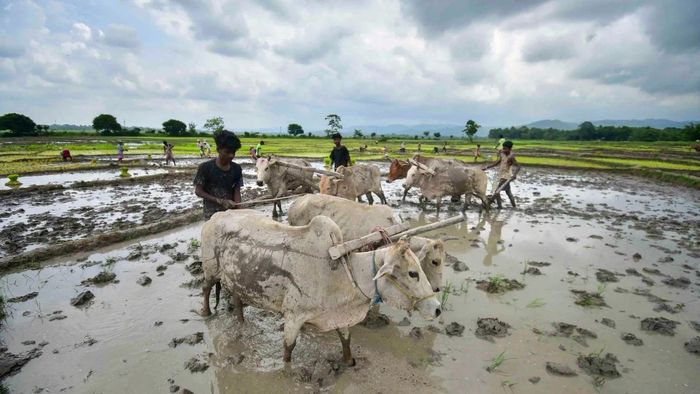Assam's PM-KISAN scheme marred by major fraud, Rs 567 crore lost to fake beneficiaries
An audit by the Comptroller and Auditor General (CAG) has uncovered significant fraud in Assam's PM-KISAN scheme, revealing that Rs 567 crore was claimed by ineligible beneficiaries. Despite the staggering loss, recovery efforts have been minimal, with only 0.24 per cent of the funds retrieved. The report highlights severe flaws in monitoring, data management, and eligibility verification, compromising the scheme's effectiveness statewide.

- Nov 06, 2024,
- Updated Nov 06, 2024, 11:36 AM IST
An audit by the Comptroller and Auditor General (CAG) has uncovered significant fraud in Assam's PM-KISAN scheme, revealing that Rs 567 crore was claimed by ineligible beneficiaries. Despite the staggering loss, recovery efforts have been minimal, with only 0.24 per cent of the funds retrieved. The report highlights severe flaws in monitoring, data management, and eligibility verification, compromising the scheme's effectiveness statewide.
The PM-KISAN scheme, a key initiative of the Central Government designed to support farmers financially, has faced substantial implementation issues in Assam. According to the CAG's audit, the scheme has been plagued by widespread fraud, administrative lapses, and poor data handling. The audit, presented to the Assam Legislative Assembly, found that 35% of beneficiaries were ineligible, yet efforts to reclaim misallocated funds have scarcely dented the total misappropriated amount.
The CAG evaluated the scheme's performance from its inception in December 2018 to March 2021—a period characterized by widespread fraud. Out of the 41,87,023 applications received, 10,66,593 (around 25%) were flagged and rejected for non-compliance with eligibility criteria. An independent investigation by the Assam government between May and July 2020 found that 37% of the 31,20,430 approved beneficiaries did not qualify but still received funds.
Despite identifying ineligible recipients, Assam's recovery efforts were limited. As of October 2021, only 0.24% of misappropriated funds had been reclaimed, none of which had been returned to the Ministry of Agriculture and Farmers Welfare.
The audit also identified other forms of misuse and irregularities in the beneficiary data. A verification led by the Chief Minister’s office, prompted by public complaints, found 15,59,286 ineligible names in the database, far surpassing initial reports by the State Nodal Officer (SNO). This discrepancy highlighted poor data practices, raising doubts about the accuracy of the records. Many ineligible recipients included non-farmers, government employees, and pensioners who gained access through fraudulent or duplicate entries.
Notably, a large portion of ineligible beneficiaries remained untraceable. Out of over 15 lakh flagged names, 11,31,152 (72.54%) could not be located, which the audit attributed to weak verification and lack of effort in confirming identities before including applicants in the scheme.
The CAG report, conducted across 10 districts with high beneficiary density, including Barpeta (the district with the highest ineligible beneficiaries), identified alarming gaps in verification and oversight. Records from 22 blocks across 11 districts were examined, showing that no database of landholding farmers was maintained, and eligibility verification guidelines were ignored.
Among the most troubling findings was the misuse of bank account information. Auditors discovered fake registration numbers created by adding zeros to the beginning of beneficiaries' bank account numbers, enabling duplicate benefits to be sent to the same account. Across 16 districts, the audit found 3,577 fake registrations, amounting to Rs 3.01 crore in unauthorized payments. Additionally, more than 3,000 instances of multiple registrations using the same bank account were flagged in 10 districts, although benefits had yet to be released to these accounts.
Fraudulent entries with jumbled names or special characters were another red flag, suggesting a deliberate attempt to evade detection. The CAG criticized supervisory officers for overlooking these anomalies, which hampered the scheme’s effectiveness. Furthermore, an audit of the SNO's administrative expenses raised concerns, with only Rs 77 lakh of the Rs 2.18 crore allocated being substantiated by utilization certificates, leaving the remainder unaccounted for.
The report pointed to a lack of monitoring, poor cooperation from the Directorate of Agriculture in sharing records, and weak supervisory oversight. It noted that speed in uploading beneficiary data was prioritized over proper eligibility checks, fundamentally undermining the scheme's goals.
Following the audit, the Assam government acknowledged the issues and in February 2022 announced a re-verification process, initiated in June 2021 under district commissioners’ oversight. This re-verification aims to ensure all beneficiaries meet eligibility standards, with safeguards introduced to prevent future fraud.
The CAG's findings underscore the need for rigorous monitoring and strict adherence to verification protocols. PM-KISAN, intended to support small and marginal farmers, requires effective implementation to achieve its mission. The large-scale fraud in Assam highlights a critical need for structural reforms and stricter oversight at both state and central levels to protect the integrity of welfare programs.
As the Assam government tackles these issues, transparency, accountability, and robust verification processes will be essential in restoring public trust and ensuring the PM-KISAN scheme benefits genuine recipients.